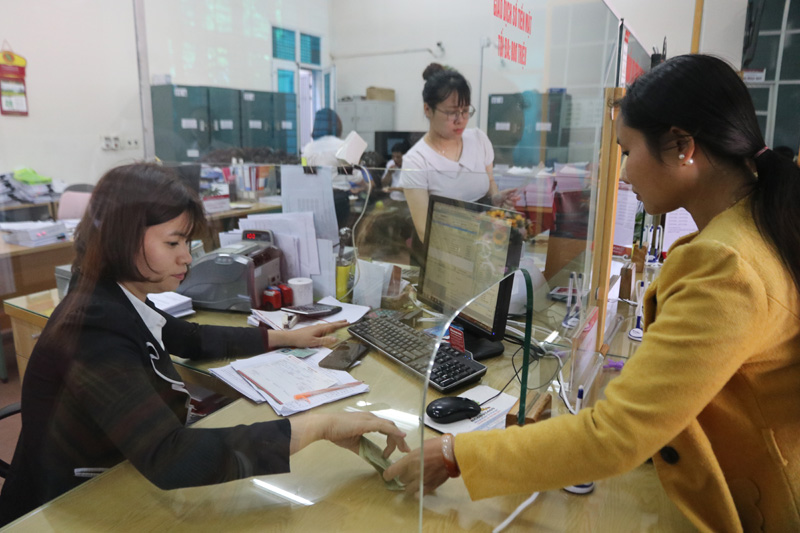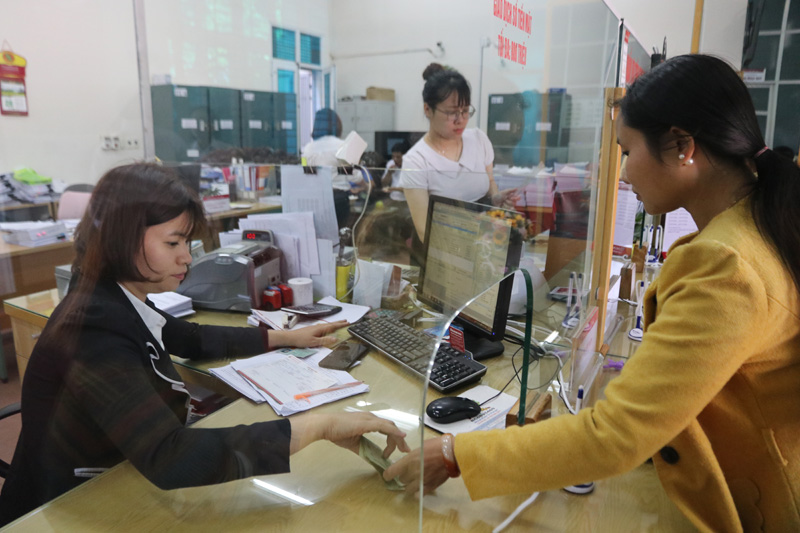
(HBO) – In the face of the COVID-19 pandemic’s impact on many economic sectors, some commercial banks in Hoa Binh province have decided to extend debt payment deadlines, not charge interest on late payments, and assist people and businesses to access preferential loans to overcome difficulties.
 The
Agribank branch in Cao Phong district has created favourable conditions for
clients to take out loans as the COVID-19 outbreak has hampered production and
business activities.
The
Agribank branch in Cao Phong district has created favourable conditions for
clients to take out loans as the COVID-19 outbreak has hampered production and
business activities.
Since the year’s beginning, the COVID-19
outbreak has greatly affected the operation of local enterprises and business
households.
A homestay facility owner in Lac village of Chieng Chau commune, Mai Chau district,
said there are about 60 homestays receiving domestic and foreign visitors in
the village at present. However, the epidemic has forced many of them to shut down
and discouraged tourists to visit here.
Nguyen Anh Tuan, Director of the MBBank’s Hoa
Binh branch, noted it has more than 30 individual clients with loans of about 5
billion VND (211,800 USD) in Hoa Binh. His branch has built plans to support
them. It has also reviewed business borrowers that operate in the fields of
hospitality, transportation and trading of goods with China so as to
provide assistance such as cutting interest rates or extending debt payment
deadlines.
According to the provincial branch of the State
Bank of Vietnam (SBV), outstanding loans in Hoa Binh totaled nearly 22.68
trillion VND through the end of February, rising by just 0.2 percent from late
2019. The sum consists of nearly 9.3 trillion VND in short-term loans and 13.38
trillion VND in medium- and long-term loans, respectively accounting for 41
percent and 59 percent of the total.
Deputy Director of the branch Ngo Quang Loi said
to carry out the SBV’s monetary policy and directions, his branch has instructed
credit organisations to keep track of the production – business situation and
losses of their clients due to COVID-19’s impact, especially sectors vulnerable
to the pandemic like tourism, agriculture and import-export, so as to take
timely measures to help them address difficulties. At the same time, it is also
working to meet the capital demand of feasible production and business plans
and prioritise capital for agriculture and rural development./.
According to data from the Hoa Binh Provincial Party Committee, the industrial production index for the first six months of 2025 is estimated to have increased by 20% compared to the same period last year. This marks the highest year-on-year growth rate for this period since 2020.
In the first six months of 2025, Hoa Binh province’s export turnover was estimated at 1.145 billion USD, marking an 18.11% increase compared to the same period in 2024. Import turnover was estimated at $ 804 million, a 17.15% increase, which helped the province maintain a positive trade balance.
The lives of the ethnic minority farmers in Tan Lac district have gradually improved thanks to the new directions in agricultural production. This is a testament to the collective strength fostered through the professional associations and groups implemented by various levels of the district’s Farmers’ Union.
With the motto the "product quality comes first,” after nearly one year of establishment and operation, Muong village’s Clean Food Agricultural and Commercial Cooperative, located in Cau Hamlet, Hung Son Commune (Kim Boi district), has launched reputable, high-quality agricultural products to the market that are well-received by consumers. The products such as Muong village’s pork sausage, salt-cured chicken, and salt-cured pork hocks have gradually carved out a place in the market and they are on the path to obtaining the OCOP certification.
In the past, the phrase "bumper harvest, rock-bottom prices" was a familiar refrain for Vietnamese farmers engaged in fragmented, small-scale agriculture. But today, a new spirit is emerging across rural areas of Hoa Binh province - one of collaboration, organisation, and collective economic models that provide a stable foundation for production.
Maintaining growing area codes and packing facility codes in accordance with regulations is a mandatory requirement for agricultural products to be eligible for export. Recently, the Department of Agriculture and Environment of Hoa Binh province has intensified technical supervision of designated farming areas and packing facilities to safeguard the "green passport" that enables its products to access international markets.



 The
Agribank branch in Cao Phong district has created favourable conditions for
clients to take out loans as the COVID-19 outbreak has hampered production and
business activities.
The
Agribank branch in Cao Phong district has created favourable conditions for
clients to take out loans as the COVID-19 outbreak has hampered production and
business activities.